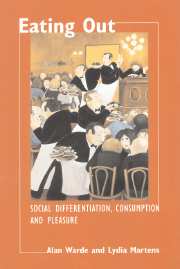Book contents
- Frontmatter
- Contents
- List of illustrations
- List of tables
- Acknowledgements
- 1 Studying eating out
- Part I Modes of provision
- Part II Access
- Part III Delivery
- Part IV Enjoyment: the attractions of eating out
- 8 Eating out as a source of gratification
- 9 The enjoyment of meal events
- Part V Conclusion
- Methodological appendix: data collection and analysis
- References
- Index
9 - The enjoyment of meal events
Published online by Cambridge University Press: 22 September 2009
- Frontmatter
- Contents
- List of illustrations
- List of tables
- Acknowledgements
- 1 Studying eating out
- Part I Modes of provision
- Part II Access
- Part III Delivery
- Part IV Enjoyment: the attractions of eating out
- 8 Eating out as a source of gratification
- 9 The enjoyment of meal events
- Part V Conclusion
- Methodological appendix: data collection and analysis
- References
- Index
Summary
In the qualitative interviews several opportunities were offered for people to evaluate the experience of eating out, affording some illustration of the applicability of this schematic classification of pleasures to the language of our interviewees. The invitation to describe the last three occasions of eating a meal out was supplemented by direct questioning, sometimes insistent, about what they liked and disliked about eating out in general – what kinds of places and foods they preferred or would always avoid. Thus much opportunity was afforded for people to discuss their tastes, their reservations and the nature of the gratifications derived. The terms that were used most frequently to describe experiences were substantively without content: people would tend to say of the various elements of the meal event that it was ‘nice’, ‘really nice’, ‘very nice’, ‘good’, ‘enjoyable’, ’lovely’, ‘fabulous’ or ‘I loved it’, ‘I liked it’. The vocabulary deployed to describe pleasures was restricted. It was, however, clear that interviewees had a practical sense that there were different types of gratification, some of which appealed more than others to different individuals. We have already indicated (in chapter 3) some of the reasons people gave for eating out and from further analysis of their talk about those reasons, we can infer the nature and relative importance to them of the different types of gratification which combine to make eating out a generally positive experience.
- Type
- Chapter
- Information
- Eating OutSocial Differentiation, Consumption and Pleasure, pp. 191 - 212Publisher: Cambridge University PressPrint publication year: 2000



